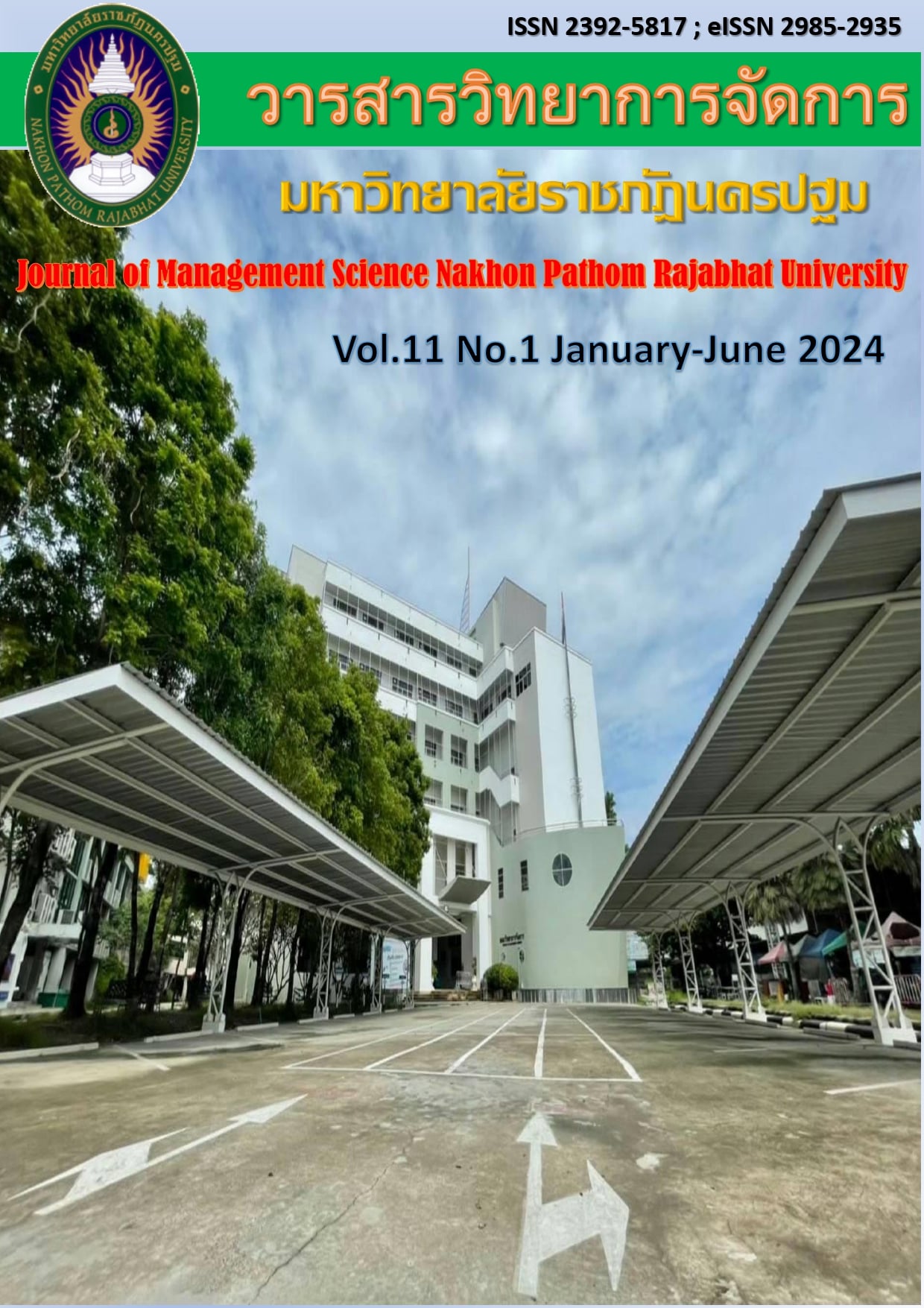Administration of Academic Credit Bank System of Private Vocational Colleges
Main Article Content
Abstract
The research format is a combined research method. Both qualitative and quantitative research the main group of informants included administrators of the Private Vocational Education Administration Office and administrators of private vocational education institutions, a total of 9 people, who used the method of selecting specific informants. The research instrument was a semi-structured interview. The sample group used in this research were administrators or academic assistants. There were 402 license holders of private vocational education institutions. The researcher determined the sample size by opening the tables of Krejci and Morgan. Then, a multistage random sampling method was used. The research tools were a questionnaire with a 5-level rating scale and group discussion points. There were 9 main informants. Statistics used in data analysis included frequency, percentage, mean, and standard deviation. Exploratory factor analysis and content analysis were used for qualitative data.
The results of the research found that
1. Components of credit banking system management for private vocational education institutions consist of 7 elements: (1) credit banking system management, (2) personnel development and training, (3) cooperation with industry and agencies, (4) quality assurance, (5) Information management support system, (6) communication and public relations, and (7) strategic management.
2. Guidelines for managing the credit banking system of private vocational education institutions according to the "7M" model, consisting of 7 elements, guidelines, and 32 factors.
Article history: Received 4 March 2024
Revised 8 May 2024
Accepted 10 May 2024
SIMILARITY INDEX = 11.29%
Article Details

This work is licensed under a Creative Commons Attribution-NonCommercial-NoDerivatives 4.0 International License.
The views and opinions of the article appearing in this journal are those of the author. It is not considered a view and responsibility of the editorial staff.
References
กรธนา โพธิ์เต็ง และประเสริฐ อินทร์รักษ์. (2566). ผลิตภาพที่พึงประสงค์ของการจัดการอาชีวศึกษาในอนาคต. Journal of Yanasangvorn Research Institute Mahamakut Buddhist University, 14(1), 71-80.
คณะกรรมการมาตรฐานการอุดมศึกษา. (2565). ประกาศคณะกรรมการมาตรฐานการอุดมศึกษาเรื่อง แนวทางการดำเนินงานคลังหน่วยกิตในระดับอุดมศึกษา พ.ศ. 2565. [ออนไลน์] ค้นเมื่อ 22 กรกฏาคม 2566 จาก https://www.ops.go.th/th/ches-downloads/edu-standard/item/7352-2565-3
ธวัช สอนง่ายดี. (2565). รูปแบบการพัฒนาครูที่ปรึกษาในสถานศึกษาสังกัดสำนักงานคณะกรรมการการศึกษาอาชีวะศึกษา. วิทยานิพนธ์ หลักสูตรการศึกษาดุษฎีบัณฑิต มหาวิทยาลัยนเรศวร.
ธีรวุฒิ บุณยโสภณ. (2555). การบริหารอาชีวะและเทคนิคศึกษาเพื่อพัฒนาอุตสาหกรรม. (พิมพ์ครั้งที่ 3) กรุงเทพฯ : มหาวิทยาลัยเทคโนโลยีพระจอมเกล้าพระนครเหนือ.
ธัญรดา เพ็งหนู พระมหาสุพจน์ สุเมโธ มะลิวัลย์ โยธารักษ์. (2566). แนวทางการประชาสัมพันธ์เพื่อการตัดสินใจของนักเรียนและผู้ปกครอง ในการเลือกโรงเรียนวีรนาทศึกษามูลนิธิ อำเภอเมือง จังหวัดพัทลุง. วารสารมหาจุฬานาครทรรศน์. 10, (5), 214–222.
นิรนาท แสนสา สุมาลี สังข์ศรี กุลชลี จงเจริญ ศิตา เยี่ยมขันดิถาวร รัตนา ดวงแก้ว ดรุณี จำปาทอง และ วรรณประภา สุขสวัสดิ์. (2566). การศึกษาการบริหารจัดการหลักสูตรแบบ Non-degree และระบบคลังหน่วยกิต ของมหาวิทยาลัยสุโขทัยธรรมาธิราชและมหาวิทยาลัยเปิดในเอเชีย. STOU Education Journal, 16 (2), 256-274.
นิรุตต์ บุตรแสนลี. (2565). การเปลี่ยนผ่านสู่ความเป็นดิจิทัลของสำนักงานคณะกรรมการการอาชีวศึกษา: การผลิตกำลังคนสมรรถนะสูงแห่งศตวรรษที่ 21. วารสารวิจัยและนวัตกรรม สถาบันการอาชีวศึกษากรุงเทพมหานคร, 5(1), B-L
นิรันดร์ สมมุติ สุวิมล โพธิ์กลิ่น และ จิณณวัตร ปะโคทัง. (2564). อนาคตภาพการจัดการศึกษาอาชีวศึกษาในยุคดิจิทัล ของสถานศึกษาสังกัดสำนักงานคณะกรรมการการอาชีวศึกษา. วารสารสันติศึกษาปริทรรศน์ มจร., 9(6), 2602-2615.
ประเวศ เวชชะ บุญชอบ จันทาพูน สุขสันต์ สอนนวล และธัชชัย จันทร์สาห์. (2565). รูปแบบและกลไกการมีส่วนร่วมในการพัฒนาคุณภาพการจัดการศึกษาโรงเรียนในถิ่นทุรกันดารห่างไกลบนพื้นที่สูงภาคเหนือประเทศไทย. วารสารวิชาการ สถาบันวิทยาการจัดการแห่งแปซิฟิค, 8(3), 153-166.
พงษ์ภิญโญ แม้นโกศล. (2564). ผลการทดลองใช้ระบบธนาคารสะสมหน่วยการเรียนรู้ของสถาบันการอาชีวศึกษาในจังหวัดตาก. วารสารบรรณศาสตร์ มศว., 14(1), 15-27.
พยุงศักดิ์ จันทรสุรินทร์. (2556). การพัฒนาคุณธรรมจริยธรรมในระบบการศึกษาไทยท่ามกลางการเปลี่ยนแปลงของสังคม. กรุงเทพฯ: โรงพิมพ์คุรุสภาลาดพร้าว.
ราชบัณฑิตยสถาน. (2556). พจนานุกรมฉบับราชบัณฑิตยสถาน พ.ศ.2554. (พิมพ์ครั้งที่ 2). กรุงเทพฯ: บริษัทอักษรเจริญทัศน์ อจท. จำกัด.
ศิริพรรณ ชุมนุม เอกวุฒิ บุตรประเสริฐ กัมปนาท บริบูรณ์ และ สุวัฒน์ วัฒนวงศ์. (2559). การพัฒนาคู่มือการเทียบโอนความรู้และประสบการณ์ของการอาชีวศึกษา. วารสารวิชาการอุตสาหกรรมศึกษา, 10(1), 19-34.
ศิวภรณ์ สองแสน. (2566). การพัฒนารูปแบบกลไกการขับเคลื่อนระบบธนาคารสะสมผลการเรียนรู้สำหรับการบริหารจัดการศึกษาเรียนรู้ตลอดชีวิต ของมหาวิทยาลัยราชภัฏเชียงราย. วารสารครุศาสตร์ จุฬาลงกรณ์มหาวิทยาลัย. 51(3).1-17.
สํานักงานคณะกรรมการการอาชีวศึกษา. (2551). พระราชบัญญัติการอาชีวศึกษา พ.ศ. 2551. กรุงเทพฯ : คณะกรรมการการอาชีวศึกษา
สำนักงานคณะกรรมการการอาชีวศึกษา. (2566). นโยบายและจุดเน้นการปฏิบัติราชการ ประจำปีงบประมาณ พ.ศ.2566. [ออนไลน์] ค้นเมื่อ 22 กรกฏาคม 2566 จากhttps://aitc.ac.th/?view=article&id=107:A8-2566&catid=12
สำนักงานเลขาธิการสภาการศึกษา. (2557). รายงานการวิจัยแนวทางการพัฒนาการศึกษาไทยกับการเตรียมความพร้อมสู่ศตวรรษที่ 21. กรุงเทพฯ : สำนักงานเลขาธิการสภาการศึกษา.
สำนักงานเลขาธิการสภาการศึกษา กระทรวงศึกษาธิการ. (2566). ปัญหาการดำเนินงานธนาคารหน่วยกิตของระดับอาชีวศึกษา. [ออนไลน์] ค้นเมื่อ 22 กรกฏาคม 2566 จากhttps https://www.pnbpeo.go.th/web/list/news/bdffe5695fe24757f27a31d004e1106a.pdf.
สุชาดา แสงดวงดี. (2564). การพัฒนากลยุทธ์การประชาสัมพันธ์การตลาดตราสินค้าผักปลอดภัย จังหวัดนครปฐมแบบมีส่วนร่วม. Journal of Multidisciplinary in Humanities and Social Sciences, 4(2), 744-756.
สุทธศรี วงษ์สมาน. (2558). การศึกษาเอกชน มาตรฐานสากล สร้างคน สร้างชาติ. [ออนไลน์] ค้นเมื่อ 22 กรกฏาคม 2566 จาก https://www.moe.go.th/moe/th/news/detail.php?NewsID=40381&Key=news_boontee
อภิชัย พันธเสน และคณะ. (2560). การพัฒนาระบบคลังหน่วยกิตเพื่อการเทียบโอนความรู้ ทักษะไปสู่การยกระดับฝีมือแรงงานตามมาตรฐานหรือการศึกษาในระดับที่สูงขึ้น ในชุดโครงการ. “นโยบายและยุทธศาสตร์การขับเคลื่อนปรัชญาของเศรษฐกิจพอเพียงและศาสตร์ของพระราชาเพื่อการพัฒนาอย่างยั่งยืนและประโยชน์สุข”. กรุงเทพฯ : สำนักงานกองทุนสนับสนุนการวิจัย (สกว.).
อรุณี ตระการไพโรจน์. (2561). ระบบธนาคารสะสมผลการเรียนรู้ สำหรับการศึกษาตลอดชีวิตของประเทศไทย. วารสารวิจัยทางการศึกษา คณะศึกษาศาสตร์ มหาวิทยาลัยศรีนครินทรวิโรฒ, 13(2). 193-206.
อุทุมพร อินทจักร์. (2562). อนาคตภาพของครูอาชีวศึกษาไทยในทศวรรษหน้า. วารสารวิจัยมหาวิทยาลัยราชภัฎมหาสารคาม, 13(1), 317-328.
เอนก เหล่าธรรมทัศน์. (2566). ธนาคารหน่วยกิตแห่งชาติ ก้าวแห่งความสำเร็จปฏิวัติการศึกษาไทย. [ออนไลน์] ค้นเมื่อ 22 กรกฏาคม 2566 จากhttps://www.salika.co/2022/03/10/academic-credit-bank-education-revolution/
Azolibe, C. B., Dimnwobi, S. K., & Uzochukwu-Obi, C. P. (2022). The determinants of unemployment rate in developing economies: does banking system credit matter?. [Online]. Retrieved April 14, 2023 from. https://doi.org/10.1108/JEAS-01-2022-0021
Braxton, S., Bronico, K., & Looms, T. (2000). The ADDIE model. Online]. Retrieved April 14, 2023 from http//www.seas.gwu.edu/sbraxton/ISD/general-phases.html [2023, 25 Oct.]
Chulatutor. (2565). ธนาคารหน่วยกิตการศึกษา. [ออนไลน์] ค้นเมื่อ 22 กรกฏาคม 2566 จาก https://www.chulatutor.com/blog/ธนาคารหน่วยกิตการศึกษา/#.Y8zXB3ZBw2w
Guidotti, F., Demarie, S., Ciaccioni, S., & Capranica, L. (2023). Knowledge, competencies, and skills for a sustainable sport management growth: A systematic review. Sustainability, 15(9), 7061.
He, X. (2023). Reflections on Bank Credit Certification for Vocational Education Credits. Creative Education, 14(1), 19-28.
Huang, J. (2021). Research on the integrated teaching model of open education and vocational education. Open Access Library Journal, 8(11), 1-10.
Huang, X., & Yang, Y. (2023, September). Design and Implementation of Credit Banking System Based on Qualification Framework. In 2023 3rd International Conference on Education, Information Management and Service Science (EIMSS 2023) (pp. 472-481). Atlantis Press.
Kee, Y. (2015). Retrospect and prospect of the Academic Credit Bank System and its advancement of educational wellbeing in Korea. International Journal of Continuing Education and Lifelong Learning, 8(1), 102-121.
Krejcie, R. V. & Morgan, D. W. (1970). Determining Sample Size for Research Activities. Educational and Psychological Measurement, 30(3), 607-610.
Kumar, A. J. P. (2022). Academic Bank of Credit–A Paradigm Shift in Transformation of Education Study. International Journal of Multidisciplinary Educational Research, 9(5), 45-53.
Mali, M., Aherkar, S., Waykos, P., & Shukla, A. (2023, October). Blockchain-Based Academic Bank of Credit Management System for Higher Education: An Innovative Approach to Student Credentialing and Progression. In 2023 IEEE International Conference on Blockchain and Distributed Systems Security (ICBDS) (pp. 1-5). IEEE.
Maravalle, Alessandro; Pandiella, Alberto Gonzalez. (2023). Improving the quality and efficiency of education and training in Costa Rica to better support growth and equity. OECD Economics Department Working Papers 1758, OECD Publishing.
National Institute Lifelong Education. (2022). For a lifelong learning of adult academic credit bank system. [Online]. Retrieved April 15, 2022 from https://www.cb.or.kr/kedi/jsp/kedi/creditbank/eng/index.htm
Wardhana, M. A., Brahmasari, I. A., & Ratih, I. A. B. (2023). Workplace learning in an effort to get recognition of Indonesian qualifications framework for career enhancement and employee competitiveness. World Journal of Advanced Research and Reviews, 18(3), 494-504.
Yan, N. (2020). Application of blockchain in academic credit bank system. In Technology in Education. Innovations for Online Teaching and Learning: 5th International Conference, ICTE 2020, Macau, China, August 19-22, 2020, Revised Selected Papers 5 (pp. 337-348). Springer Singapore.


